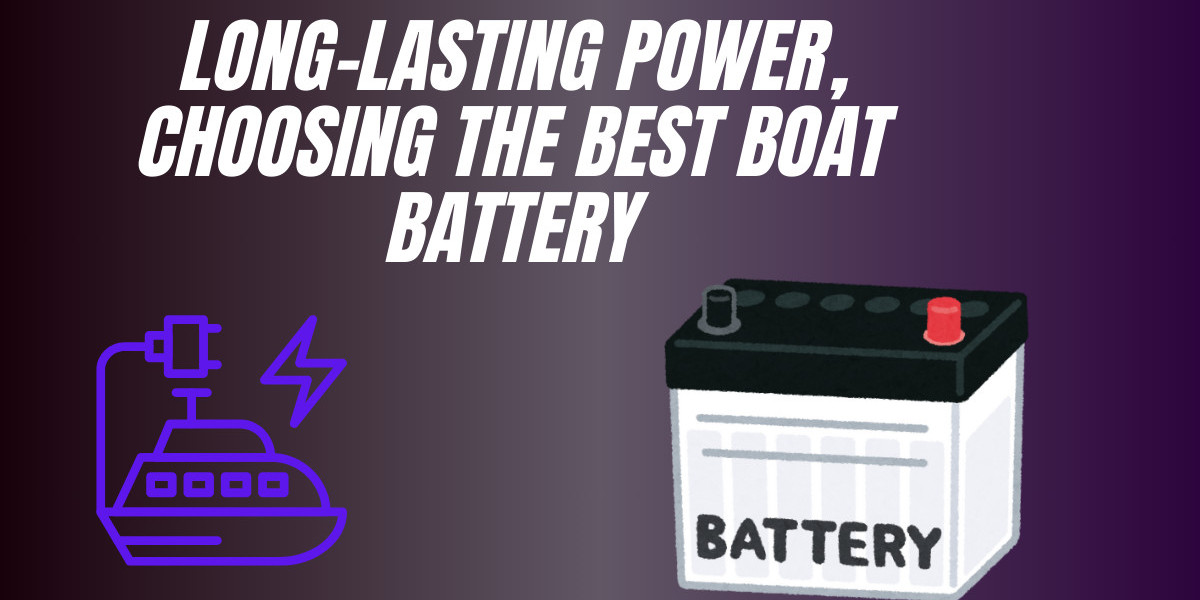When it comes to powering your marine adventures, nothing is more crucial than a reliable boat battery. This vital component ensures your vessel starts smoothly, supports your electronics, and powers all the necessary equipment for a successful trip. In this comprehensive guide, we'll delve into everything you need to know about boat batteries—from selecting the right one to maintaining it for peak performance. Whether you're a seasoned sailor or a newcomer to boating, this guide will provide valuable insights to help you make informed decisions about your boat battery.
What is a Boat Battery?
A boat battery is explicitly designed to withstand the marine environment. Unlike regular car batteries, boat batteries need to handle the unique demands of boating, such as prolonged use, vibrations, and exposure to saltwater. These batteries come in various types, each tailored to different boating needs, including starting engines, powering electronics, and providing backup power.
Types of Boat Batteries
Starting Batteries
Starting batteries are designed to provide a large burst of power to start your boat's engine. These boat batteries have a high cranking amp rating, ensuring they can deliver the necessary energy to start the engine quickly. Once the engine is running, the alternator takes over, recharging the battery.
Deep Cycle Batteries
Deep-cycle batteries are built to provide a steady amount of power over an extended period. They are ideal for powering accessories like GPS units, fish finders, and lights. Unlike starting batteries, deep-cycle boat batteries can be discharged and recharged multiple times without significantly affecting their performance.
Dual Purpose Batteries
Dual-purpose batteries combine the features of starting and deep-cycle batteries. They are versatile and can start the engine and power accessories. If you have limited space or want to simplify your setup, a dual-purpose boat battery might be the best choice.
Lithium-ion Batteries
Lithium-ion boat batteries are the latest innovation in marine power. They offer a higher energy density, longer lifespan, and faster charging times compared to traditional lead-acid batteries. While they come with a higher upfront cost, their long-term benefits often outweigh the initial investment.
Choosing the Right Boat Battery
Selecting the correct boat battery involves several factors. Here's a guide to help you choose the best battery for your needs:
Assess Your Power Needs
Before purchasing a boat battery, evaluate your power requirements. Consider the type and number of devices you plan to use on your boat. For example, if you have multiple electronics and lighting systems, a deep cycle or dual-purpose boat battery might be more suitable.
Battery Size and Fit
Ensure that the boat battery you choose fits your boat's battery compartment. Measure the dimensions of your current battery or the available space to avoid compatibility issues. Most boat batteries come in standard sizes, but it's always good to double-check.
Battery Capacity
Battery capacity, measured in amp-hours (Ah), indicates how much power the battery can store. A higher Ah rating means the battery can supply more energy for a more extended period. Choose a boat battery with adequate capacity to meet your power needs and ensure you have enough reserve power for emergencies.
Brand and Quality
Invest in a reputable brand known for high-quality boat batteries. Well-known brands often offer better warranties and customer support. Additionally, a high-quality battery will likely last longer and perform better under challenging marine conditions.
Maintaining Your Boat Battery
Proper maintenance is essential for extending the life of your boat battery and ensuring reliable performance. Follow these tips to keep your battery in top condition:
Regular Inspection
Check your boat battery regularly for signs of corrosion, leaks, or damage. Clean the terminals with a mixture of baking soda and water to remove any corrosion. Ensure that the battery is securely fastened and free from any physical damage.
Charge Your Battery
Keep your boat battery charged, especially if you're not using it frequently. A fully charged battery is less likely to suffer from sulfation, a condition in which lead sulfate crystals build up on the battery plates and reduce its capacity.
Store Properly
When storing your boat battery for an extended period, could you keep it in a cool, dry place? Avoid placing it on a concrete floor, as this can cause discharge through the battery case. Use a battery maintainer or trickle charger to keep the battery at optimal charge levels.
Check Electrolyte Levels
For traditional lead-acid boat batteries, check the electrolyte levels periodically. Ensure the plates are covered with electrolytes, and add distilled water if necessary. Never overfill the battery, as this can cause spillage and potential damage.
Troubleshooting Common Boat Battery Issues
Difficulty Starting the Engine
If you experience trouble starting your engine, it could be due to a weak or dead boat battery. Check the charge level and connections. If the battery is old or shows signs of wear, consider replacing it.
Dim Lights or Electrical Issues
Dim lights or malfunctioning electronics can indicate a problem with your boat battery or charging system. Verify the battery's charge and inspect the connections. Ensure that the alternator is functioning correctly and charging the battery as needed.
Corrosion on Terminals
Corrosion on battery terminals can affect the performance of your boat battery. Clean the terminals regularly and apply a corrosion inhibitor to prevent future buildup. Ensure that the connections are tight and secure.
Upgrading to a Lithium-ion Boat Battery
If you're considering an upgrade, a lithium-ion boat battery offers several advantages over traditional lead-acid batteries. These include:
Longer Lifespan
Lithium-ion batteries typically last longer than lead-acid batteries, providing more value over time. They have a lower rate of self-discharge and can handle more charge cycles before needing replacement.
Faster Charging
Lithium-ion boat batteries charge faster, allowing you to spend more time on the water and less time waiting for your battery to recharge. This can be particularly beneficial for frequent boaters.
Higher Energy Density
With a higher energy density, lithium-ion batteries provide more power in a smaller, lighter package. This can be advantageous for boats with limited space or weight restrictions.
Conclusion
Choosing and maintaining the correct boat battery is essential for a smooth and enjoyable boating experience. By understanding the different types of batteries, assessing your power needs, and following proper maintenance practices, you can ensure your boat remains powered and ready for adventure. Whether you opt for a traditional lead-acid battery or upgrade to a cutting-edge lithium-ion model, the correct boat battery will enhance your time on the water and keep your marine equipment running efficiently.



